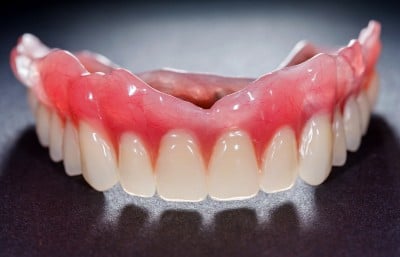 Dentures can be a great tooth replacement option if they’re properly fitted and maintained. But your mouth remains the gateway to your body, and even after your teeth are gone, your mouth remains a pathway that disease can follow to enter the body.
Dentures can be a great tooth replacement option if they’re properly fitted and maintained. But your mouth remains the gateway to your body, and even after your teeth are gone, your mouth remains a pathway that disease can follow to enter the body.
While gum disease, which is associated with heart problems, is a common concern for people with teeth, those who have lost all their teeth will worry about a different condition: aspirational pneumonia.
Fortunately, with properly fitting dentures that are properly cared for, this risk can be virtually eliminated.
What Is Aspirational Pneumonia?
Pneumonia occurs when the lung becomes infected. The most serious forms of pneumonia tend to be bacterial, but they can also be fungal and viral.
Pneumonia can enter the lungs as a secondary infection because you’ve got the bacteria, viruses, or fungi elsewhere in the body.
In aspirational pneumonia, the bacteria don’t need to come from a serious infection, they are inhaled because they are in the mouth. Studies have shown that bacteria from dentures are commonly inhaled, and that dentures can increase the risk of pneumonia, especially if they are worn at night.
To prevent pneumonia, it’s important to reduce the accumulation of bacteria on dentures.
Properly Fitting Dentures Keep Cleaner
One key to keeping dentures cleaner is making sure they fit properly. Properly fitting dentures work better with the body’s natural mechanisms for removing food from the mouth, including the natural motions of the tongue.
Most importantly, though, properly fitting dentures are less likely to come dislodged and get food particles under them. Since food particles fuel bacterial growth, this can help reduce the amount of bacteria on your dentures.
And even the best-fitting dentures can benefit from the use of denture adhesive. Even when it’s not necessary to hold dentures in place, it helps create a tight seal that keeps food and bacteria from accumulating under the dentures.
Proper Denture Care to Remove Bacteria
Even great-fitting dentures will accumulate bacteria over the course of the day. Thorough cleaning of dentures will remove food particles and bacterial plaque.
Remove dentures at night and brush them thoroughly. Remove all visible food and plaque. Then place them in an approved denture cleaner or soak. Over the counter denture cleansers, like this one by Polident, are highly effective at removing bacteria from dentures.
As with your natural teeth, proper care of your dentures is necessary to protect your overall health. And it’s essential to start with the best-fitting dentures available. If you would like to learn more about getting an improved fit for your dentures, please call (02) 9686 7375 for an appointment with a Sydney denture dentist at My Hills Dentist.

